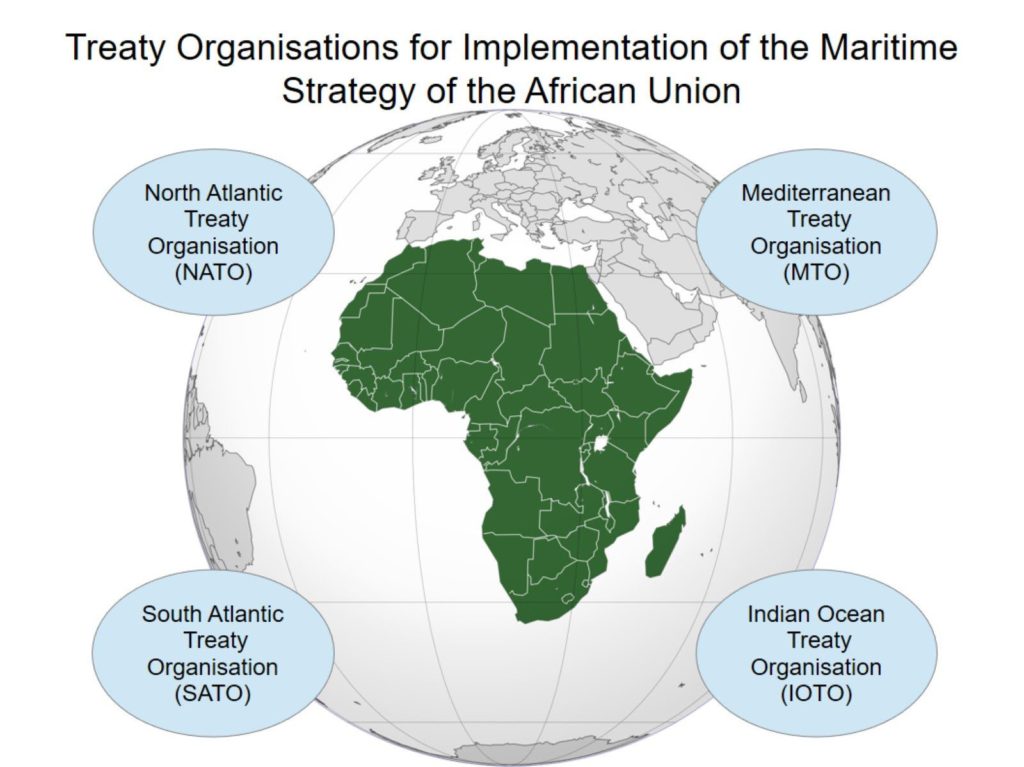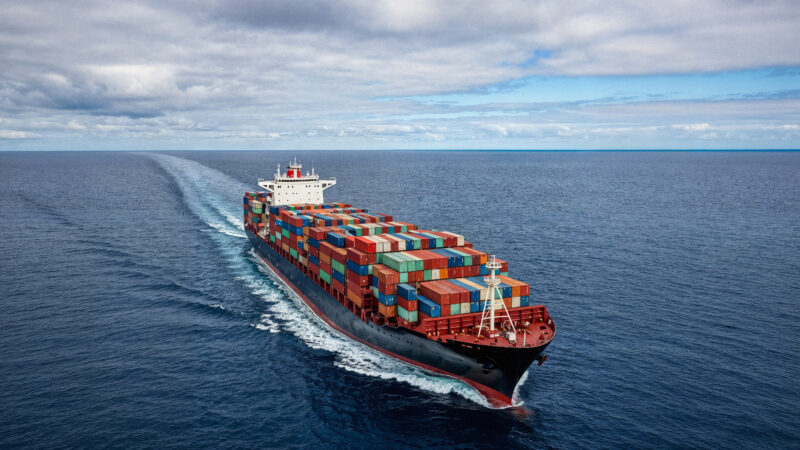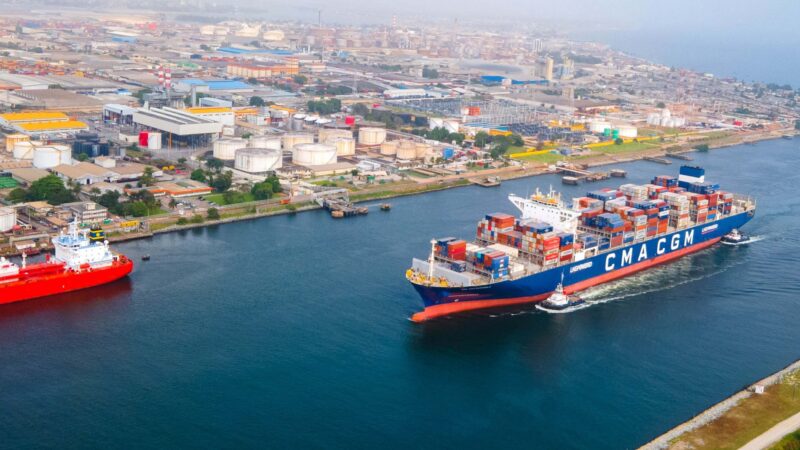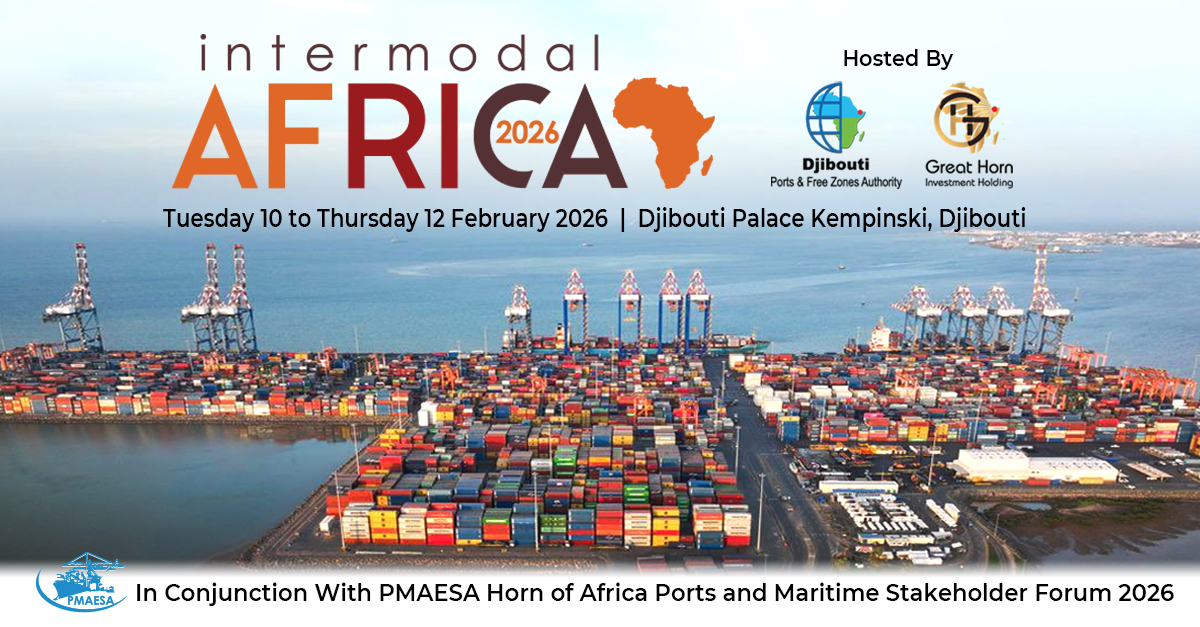Developing three Military Treaty Organisations around the African Continent?
Why this project plan?
Observing the growing need for a better bargaining base in international trade, for instance with China, the African Union can support its African coastal states to develop military treaty organisations, like the North Atlantic Treaty Organisation (NATO), based on collective defense and standardization. These organisations will empower the African coastal states in protecting their territorial waters and their adjacent seas and oceans against threats like international theft of oil or other natural resources, piracy, armed robbery, illicit trafficking of human, of animals, of drugs and of weapons, illegal fishing and pollution. These treaty organisations will also be instrumental in implementing the African Integrated Maritime Strategy 2050 and will develop the military maritime version of the African Standby Force, which is until now mainly landfocused. During the 2021 Celebration of the African Day of the Seas and Oceans on 6th of August 2021, the President of the Seychelles called to halt the plundering of the natural resources of these seas and oceans around the African continent. Developing these military treaty organisations will be instrumental in this fight against this organized crime, which is international in its nature also.
What does it mean?
The concept of collective defense and standardization of plans, procedures but also language and equipment has made NATO to one of the most succesful international military organisation of our centuries¹. Created by a small number of member nations under the leadership of the United States of America in Washington in 1949, it has been growing to 30 member nations around the North Atlantic Ocean nowadays.
So it starts with a lead nation, which signs a treaty for collective defense and standardization with some adjacent states and by proof of success it multiplies itself. Key in the concept is international coo, which is lacking now most of the time, so the international organized crime simply looks for the less protected African coasta states to exploit their malicious buisiness. Real sisterhood and brotherhood among African coastal states will empower these less protected African states and the mutual cooperation will multiply these protecting forces.
How can it be established?
What it is needed now is the political will of a lead nation to develop the initial treaty and sign this treaty with adjacent coastal states. As the African continent is gigantic and has more than 30 coastal states, it seems to be feasible to develop three military treaty organisations around the African continent: the South Atlantic Treaty Organisation (SATO), the Indian Ocean Treaty Organisation (IOTO) and the Mediterranean Treaty Organisation (MTO) (see figure 1).
The African Union could develop and embrace the founding principles of these treaty organisations, tailor them to the three respective regions and invite strong African nations to lead these efforts. The NATO Strategic Direction South Hub in Naples, Italy might explore and develop the NATO nations appetite and expertise to export the founding principles of NATO to the African continent, especially with regard to the lead nations of the respective African treaty organisations. The NATO support to the African Union Mission is the ongoing NATO mission which might develop the respective treaties and sponsor the lead nations of these three military treaty organisations.
When should it start?
In order to gain from cooperation and mutual learning among all African coastal states, it is recommended to develop these three African military treaty organisations simultaneously, after the African Union decides to use these organisations for implementation of its African Integrated Maritime Strategy 2050, which is already approved in 2018. Fall 2021 seems to be the earliest moment to invite the African Union leadership to accept this projectplan for decision making in the next African Union Summit, early 2022. The NATO Strategic Direction South Hub is encouragedby the NATO Brussels Summit of June 2021² to develop reasonable responses to mutual security concerns in North Africa, like the growing threat of China for international maritime commerce worldwide, with a focus on the African Union. Empowering the African continent will help to create a better world-wide power balance, also among maritime military superpowers like Brazil, China, India, the Russian Federation and the United States.
By Commander (ret.) Dr. Marten Meijer
Senior Maritime Specialist, The Netherlands
dr.marten.meijer@gmail.com
1 See: https://www.nato.int/cps/en/natohq/news_185000.htm, paragraph 2.
2 See: https://www.nato.int/cps/en/natohq/news_185000.htm, paragraph 4.
About the author :
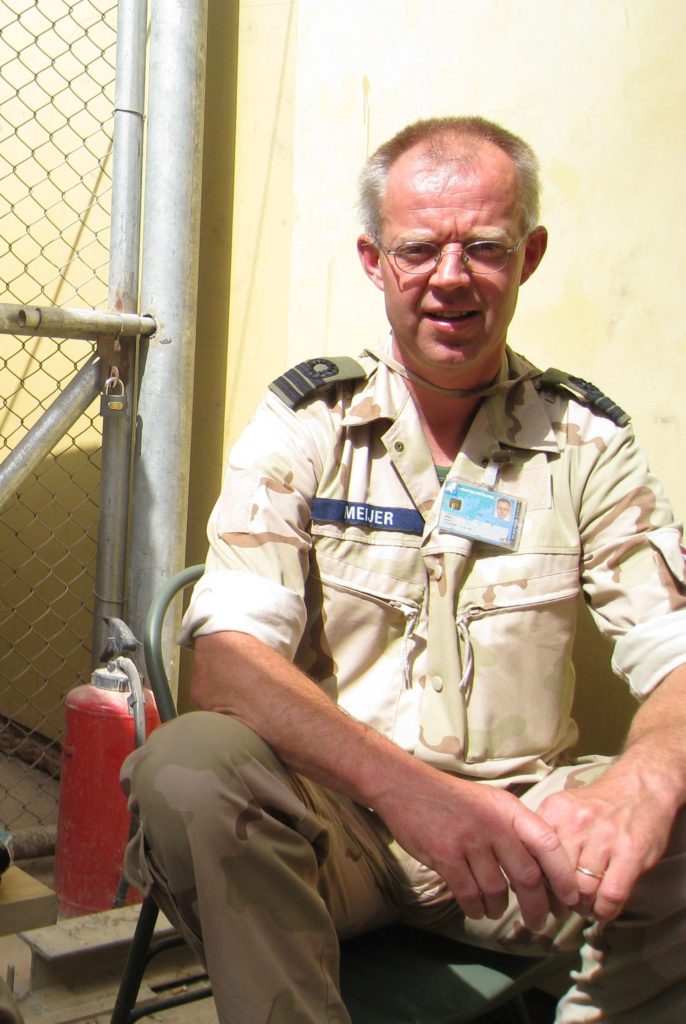 Marten Meijer (1962) earned a masters degree in Organizational Psychology at the University of Groningen in 1986 and a doctorate in Social Sciences at the Erasmus University in Rotterdam in 1998. From January 2005, commander Marten Meijer served at the NATO Science and Technology Organization in Paris (FRA) as the executive officer of the Human Factors and Medicine Panel.
Marten Meijer (1962) earned a masters degree in Organizational Psychology at the University of Groningen in 1986 and a doctorate in Social Sciences at the Erasmus University in Rotterdam in 1998. From January 2005, commander Marten Meijer served at the NATO Science and Technology Organization in Paris (FRA) as the executive officer of the Human Factors and Medicine Panel.
He was an associate professor at the Faculty of Military Sciences of the Netherlands Defense Academy in Breda, the Netherlands from April 2008. He participated in a field study in ethical decision making in the NATO International Security Assistance Force in Afghanistan in July 2008. He also studied social safety in the Netherlands armed forces and the effectiveness of asymmetrical operations.
In January 2011 he was assigned to the NATO Command and Control Centre of Excellence as Branch Chief Expertise Management. He provided feedback to NATO commands in Mons, Belgium, Northwood, Great Britain and Naples, Italy, on the implementation of the NATO Comprehensive Approach in NATO Operation Unified Protector in Libya and in NATO Operation Ocean Shield, off the coast of Somalia.
From October 2013 thru July 2017 commander Meijer served as a subject matter expert on NATO Strategic Communication at the NATO Joint Warfare Centre in Stavanger, Norway. He chairs the monthly Joint Warfare Centre Strategic Communication Round Table and is a member of the Joint Warfare Centre Gender Group. In 2014 he received the NATO scientific achievement award for his contributions to a NATO research group on agility in decision making. From October 2016 thru March 2017 he was assigned to the United States Central Command in Tampa, Florida as a strategic communication consultant for the international coalition operation Inherent Resolve, which aims to defeat ISIS terrorists in Iraq and Syria. In september 2017 he started his last assignment at the Policy Branch of the NATO Joint Force Command Naples in Italy, from which headquarter he deployed to Addis Ababa to support the African Union in maritime policies. He retired as of May 2020.
Off duty, he is a dinghy regatta sailor and competed in the military world championships in saling in Karlskrona, Sweden, Den Helder, The Netherlands, San Diego, USA , Copenhagen, Danmark and Victoria, Canada. He owns a former Olympic Class Flying Dutchman (H 303) and is a sailing instructor. He married Maria Helena Van Kooten in 1993 and they got a daughter Jantine, 1996, and two sons, Clemens 1995, and Tijmen, 1998.



